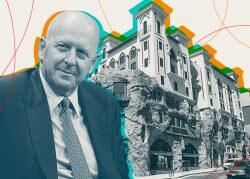Construction of more than 1,000 units of student housing at UC Berkeley is on hold after a judge ruled that the university has to explore alternatives to the project at People’s Park.
Protestors have been disrupting construction that started earlier this month and progress had been at a standstill due to safety concerns.
People’s Park has historical significance to Berkeley’s reputation of activism and demonstrations against traditional institutions. Thousands of demonstrators would gather there in the 1960s to protest local and national causes. When news broke that the park was slated to be cleared for a 16-story housing development for 1,100 students, a number of Berkeley residents took it as a call to action to keep the park intact.
The university, which owns the land, started clearing the space earlier this month. The next day protests halted operations by knocking down fences, surrounding the park and damaging construction equipment.
Citing Berkeley’s ban on the use of pepper spray and tear gas, the Alameda Sheriff’s Department would not clear the park of protestors. According to public records, Judge Teri Jackson signed a stay order to allow the court to review an appeal petition by Make UC a Good Neighbor and the People’s Park Historic Advocacy Group on their California Environmental Quality Act (CEQA) lawsuit.
The ruling has stopped construction until at least October. The court instructed the university to justify why the residential units could not be built at another location. Fences are allowed to remain up, however construction and demolition must cease.
The university expressed disappointment for the delay, but remains confident about the project moving forward.
“While this new injunction will add further delay and significant additional costs to the project, we are pleased the court has agreed to an expedited process,” Kyle Gibson, UC Berkeley spokesperson, said. “We are also satisfied with the court’s decision to allow the campus to close and secure the construction site pending the expedited ruling.”
Chancellor Carol Christ, in a memo to students, reiterated the university is confident “in our legal position and remain strongly committed to the project.” She went on to reassure any students with concerns about the park retaining its historical significance.
“Plans for the space involve the preservation of nearly two-thirds of the site as open green space; two housing facilities — one for students and one for extremely low-income members of the greater Berkeley community; the provision of housing, services and a new daytime center for unhoused people who previously gathered on the site and slept there.”
Read more

